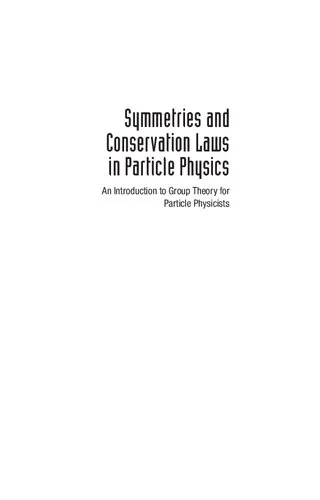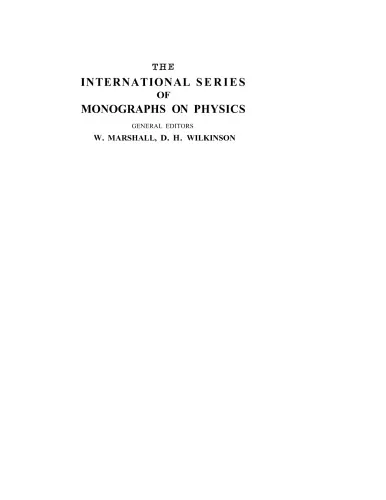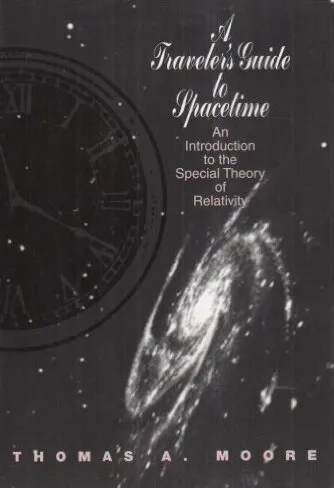Symmetries and Conservation Laws in Particle Physics: An Introduction to Group Theory for Particle Physicists
4.8
Reviews from our users

You Can Ask your questions from this book's AI after Login
Each download or ask from book AI costs 2 points. To earn more free points, please visit the Points Guide Page and complete some valuable actions.Related Refrences:
Introduction to 'Symmetries and Conservation Laws in Particle Physics: An Introduction to Group Theory for Particle Physicists'
Welcome to an immersive exploration of the intricate world of particle physics and its profound connection with the mathematical elegance of group theory. This book serves as a comprehensive guide for budding physicists and enthusiasts, aiming to deepen their understanding of how symmetries and conservation laws shape the behavior and interactions of fundamental particles.
Detailed Summary of the Book
In 'Symmetries and Conservation Laws in Particle Physics', Stephen Haywood embarks on an enlightening journey to unravel the complex yet fascinating connection between group theory and particle physics. The text is crafted for an audience with a basic understanding of quantum mechanics and classical physics, aiming to bridge the gap to more advanced topics.
The book begins with a gentle introduction to the concept of symmetry, illustrating how it pervades both natural phenomena and theoretical models. The initial chapters lay the groundwork by discussing continuous and discrete symmetries, showcasing their pervasive role in nature. Moving forward, the book introduces group theory as the mathematical language necessary to describe these symmetries effectively.
Subsequent chapters delve into the fundamental groups like SU(N), SO(N), and Sp(N) that are paramount in describing particle interactions. The text explains the representation theory, highlighting its utility in predicting particle properties and reactions. The book takes a pragmatic approach, interweaving theory with applications in quantum field theories, the Standard Model, and beyond.
Ultimately, the book culminates in an exploration of how these mathematical frameworks lead to conservation laws, emphasizing Noether's theorem and its implications in theoretical physics. Haywood ensures that these concepts are not only explained textually but are reinforced with problem sets and examples, allowing readers to apply their knowledge and build intuition.
Key Takeaways
The core objective of this book is to equip readers with a solid understanding of how symmetries underlie the fundamental laws governing particles. Key takeaways include:
- Understanding the pivotal role of symmetry in formulating physical laws.
- Learning the fundamentals of group theory and its representation in physics.
- Application of group theoretical concepts to the Standard Model.
- Insight into conservation laws derived from symmetrical considerations.
Famous Quotes from the Book
"Symmetry is not merely a curious construct of human thought but a fundamental principle that the universe seems to adhere to with unerring precision."
"In the majestic language of group theory, the universe whispers its secrets to those willing to listen."
Why This Book Matters
The significance of 'Symmetries and Conservation Laws in Particle Physics' lies in its unique approach to merging the robust mathematical framework of group theory with the empirical world of particle physics. In an era where understanding the fundamental forces and constituents of nature is more important than ever, this book provides an essential toolkit for students and researchers alike.
Stephen Haywood's work stands out for its clarity and pedagogical value, making complex concepts accessible without sacrificing depth. By demystifying the connections between mathematics and physics, the book empowers its readers to engage with cutting-edge research, fostering a new generation of physicists who can contribute to unearthing the mysteries of the universe.
In conclusion, this book is not just an academic text; it is an invitation to wonder, explore, and understand the symmetries that define the cosmos.
Free Direct Download
You Can Download this book after Login
Accessing books through legal platforms and public libraries not only supports the rights of authors and publishers but also contributes to the sustainability of reading culture. Before downloading, please take a moment to consider these options.
Find this book on other platforms:
WorldCat helps you find books in libraries worldwide.
See ratings, reviews, and discussions on Goodreads.
Find and buy rare or used books on AbeBooks.
1540
بازدید4.8
امتیاز0
نظر98%
رضایتReviews:
4.8
Based on 0 users review
Questions & Answers
Ask questions about this book or help others by answering
No questions yet. Be the first to ask!














